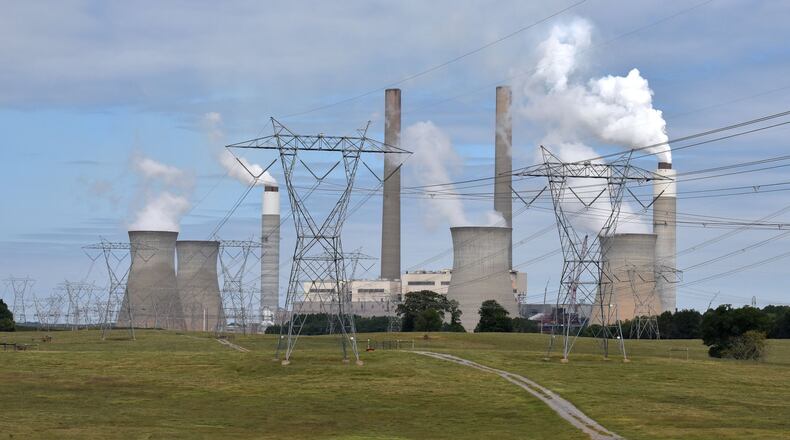The federal Environmental Protection Agency (EPA) has notified counterparts at the Georgia Environmental Protection Division (EPD) that they believe the state may be allowing Georgia Power to store toxic coal ash in ways that are “less protective” than federal standards require.
The EPA’s concerns, detailed in a letter dated February 13, are the most significant sign yet that federal officials are closely scrutinizing Georgia Power’s plans for permanently disposing of millions of tons of coal ash left around the state, the product of decades of burning coal for power.
Ash contains toxic metals like lead, mercury, cadmium and arsenic, which have been linked to cancers and other serious illnesses and can contaminate water and soil, if mishandled. Coal ash is a common additive in concrete mixes, which safely locks the material away.
The EPA letter, which was shared with The Atlanta Journal-Constitution, was sent by Jeaneanne Gettle, the agency’s acting administrator in Region 4, which includes Georgia, seven other Southeastern states and six federally recognized tribes. It was addressed to Georgia EPD Director Jeff Cown.
Georgia Power has coal ash stored around the state in 12 landfills and 29 ash ponds, watery lagoons where the material is submerged to keep it from blowing away. Georgia is one of only three states allowed to oversee ash pond closures after EPA found the state’s program incorporated all federal rules.
The EPA’s worries stem from a final closure permit EPD issued last November for an ash pond at Plant Hammond, a coal-fired power station outside Rome that was shuttered in 2019. The pond, known as Ash Pond 3, contains more than 1.1 million cubic yards of toxic ash on the banks of the Coosa River.
Georgia’s permitted plans for Ash Pond 3 call for the material to be capped by a heavy-duty plastic cover, followed by synthetic drainage material and 18 inches of soil and vegetation. Later, solar panels will be installed over the site. The pond has no bottom liner and toxic ash will remain in contact with groundwater, permanently, even after the site is closed.
It was not immediately clear whether the closure work at the site has been completed.
Federal rules require that coal ash ponds be closed to prevent liquids from coming into contact with the waste to the “maximum extent feasible,” among other stipulations. In its letter, EPA says it believes the plans for coal ash, also known as coal combustion residuals (CCR), at Ash Pond 3 fall short of the requirements.
“The Agency is unaware of a circumstance where these standards could be, or have been, met when the waste in a closed, unlined impoundment remains in contact with groundwater that freely migrates in and out of the CCR remaining in the closed unit,” the EPA’s letter reads.
The agency also outlined deficiencies in the groundwater monitoring network installed around the site, and expressed concern that several limestone “voids” beneath the pond were not fully investigated and could allow contaminants to escape.
The EPA said it met with Georgia environmental officials before the final permit was issued and outlined these concerns, but EPD moved forward anyway. At the end of the letter, Gettle, the regional EPA administrator, suggested the two agencies meet soon to discuss the matter.
In a statement, EPD spokeswoman Sara Lips said staff thoroughly evaluated the permit for Ash Pond 3 and indicated the agency disagrees with EPA’s view that the closure plans don’t abide by federal rules.
“The issued permit meets the federal and state performance standards and the requirements for Georgia’s delegated program,” Lips added.
Georgia Power spokesman John Kraft said the company is aware of the EPA letter.
“At Georgia Power, we continue to work to ensure that our ash pond closure plans are protective of the environment and the communities we serve,” Kraft said.
Environmental groups, who for years have argued that Georgia Power’s plans at some facilities were inadequate, called for action in the wake of the letter.
“As EPA makes it abundantly clear, these waste pits can’t comply with the federal and state requirements if they remain in groundwater,” said Chris Bowers, a senior attorney at the Southern Environmental Law Center. “EPD can still correct course, or risk delegitimizing its state permit program further.”
Next door in Alabama, the EPA recently proposed denying that state’s request to oversee its own coal ash disposal program. Its decision was made, in part, because the agency found Alabama’s permitting did not require facilities to adequately prevent and monitor for groundwater infiltration.
Other groups called for the federal government to take similar action and claw back Georgia’s license to permit its ash ponds.
“We’re excited to see this step from EPA and hope the agency will begin the process of revoking Georgia’s authority to manage coal ash if EPD continues to ignore federal regulations,” said Jesse Demonbreun-Chapman, executive director and riverkeeper at the Coosa River Basin Initiative.
About the Author
Keep Reading
The Latest
Featured



